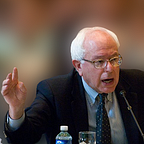Our Plan to Make Public Colleges and Universities Tuition-Free
Brothers and sisters: As all of you know, we have a crisis in higher education funding today. This crisis not only impacts the lives of millions of our people. It impacts the future of our economy and, in fact, the future of our country. In a highly competitive global economy, in an economy where technology is changing the very nature of work and the jobs we perform, we need the best educated workforce in the world. Thirty or forty years ago, that used to be the case. That is not the case today.
All over this country, I have talked to young people who did well in high school, who are academically qualified and anxious to get a higher education, but who have given up the dream of going to college because higher education is just too expensive. That is unfair to those young Americans, and counter-productive to the best interests of our country. That has got to change.
I’ve talked to others who have left college $50,000 in debt, or graduate school hundreds of thousands in debt.
Unacceptable! People should not have to spend decades paying back loans because hey chose to get a good education.
In the richest country in the history of the world, everyone who has the desire and the ability should be able to get a college education regardless of income and without being burdened with crushing debt.
In the twenty-first century, a public education system that goes from kindergarten through high school is no longer good enough. When we talk about public education today, it must also mean making public colleges and universities tuition free and substantially reducing student debt.
Forty or fifty years ago, if you had a high school degree, the odds were that you could get a decent-job and make it into the middle class. But that is not the world we live in today.
Today, a college degree is the equivalent of what a high school degree was a generation ago.
In America today, the median worker with a bachelor’s degree will earn almost $1 million more over their career than that same worker with just a high school diploma. Further, a worker that earns an associate’s degree will make about $360,000 more over their career than a high school graduate.
The U.S. once led the world in the percentage of young college graduates. Today, we are in 11th place behind countries like Japan, South Korea, Canada, England, Ireland, Australia, and Switzerland. That is not a prescription for a strong American economy of the future. It is a prescription for failure.
In the year 2017, we should be encouraging our people to get the best education they can, not punishing them with a mountain of debt, not denying them entry to college because of the cost.
And that’s exactly what The College for All Act that we introduced today would do.
Under our legislation, children from any family making $125,000 or less — about 80 percent of our population — would be able to attend a public college or university free of tuition and fees.
We will cut student loan interest rates in half by allowing Americans to refinance their debts at the lowest interest rates possible. It makes no sense that you can refinance your home or your car when interest rates are low, but you can’t refinance your student debt. That will change under our bill.
We will end the absurdity of the federal government profiting off of the student loan program. Over the next decade, the federal government is projected to make over $70 billion in profits off of student loan programs — much of that from working class families. How crazy is that?
And we will triple the funding of the Work Study Program to help over 2 million students receive the jobs and the training they need.
Let’s be clear: This legislation is not a radical idea.
In 1965, average tuition at a four-year public university was just $256.
In the 1970s, the City University of New York and the University of California were tuition free.
In 1944, we passed the GI Bill providing a free college education to millions of World War II veterans.
Through the GI Bill, veterans got the education they needed to become doctors, scientists, engineers, astronauts, and lawyers. And for every dollar the federal government spent on the GI Bill, the federal government received about $7.00 in additional revenues.
Other nations around the world understand the benefits of having an educated workforce that isn’t burdened with enormous student debt.
In Germany, Finland, Denmark, Iceland, Norway, and Sweden public colleges and universities are free. Governments in those countries understand the value of investing in their young people. So should we!
Now, some people will say, “making public colleges and universities tuition-free is a good idea, but it’s expensive, it costs a lot of money. How are you going to pay for it?”
Let me tell you exactly how we are going to pay for it.
We are going to put a tax on Wall Street speculation.
Specifically, the Inclusive Prosperity Act, which I am also introducing today, would impose a Wall Street speculation tax of 0.5 percent on stock trades, a 0.1 percent fee on bonds, and a 0.005 percent fee on derivatives.
More than 1,000 economists have endorsed a tax on Wall Street speculation and some 40 countries have already imposed a similar financial transactions tax.
Let us never forget that during the financial crisis, Wall Street received the largest taxpayer bailout in the history of the world.
Now, it’s Wall Street’s turn to help bail out the disappearing middle class.
As a nation, we need to get our priorities right. We don’t need more tax breaks for the very rich. We need to make sure that working class kids have an opportunity to get the education they need to do well in the modern world.
